formerly eScholarship Editions


|
|
|
|
Your search for
'Conservation' in subject
found 10 book(s). | Modify Search | Displaying 1 - 10 of 10 book(s) | |
| 1. | 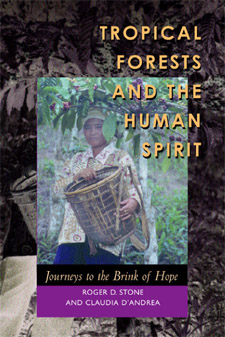 | Title: Tropical forests and the human spirit: journeys to the brink of hope Author: Stone, Roger D Published: University of California Press, 2002 Subjects: EcologyEvolutionEnvironment | Ecology | Conservation | Anthropology Publisher's Description: Tropical forests are vanishing at an alarming rate. This book, based on extensive international field research, highlights one solution for preserving this precious resource: empowering local people who depend on the forest for survival. Synthesizing a vast amount of information that has never been brought together in one place, Roger D. Stone and Claudia D'Andrea provide a clearly written and energizing tour of global efforts to empower community-based forest stewards. Along the way, they show the fundamental importance of tropical forest ecosystems and deepen our sense of urgency to save them for the benefit of billions of rural people in tropical and subtropical regions as well as for countless species of plants and animals. In their travels to research this book, the authors saw many remarkable examples of how proficient even the poorest local people can be in stabilizing and recovering formerly destitute forests. With engagingly written case studies from Thailand's Golden Triangle to Mindanao in the Philippines, from Indonesia, India, and Africa to Brazil, Mexico, and Central America, they introduce us to the communities and the individuals, the governments, the loggers, the agencies, and the local groups who vie for forest resources. Contrasting community-based efforts and traditional forest management with government and donor efforts, they discuss the many reasons why international institutions and national governments have been unable and unwilling to stem the accelerating loss of tropical forestland. This book argues we are paying a terrible price--politically, economically, and environmentally--for allowing tropical forests to be stripped. Community-based forestry is no panacea, but this book clearly shows its effectiveness as a management technique. [brief] Similar Items |
| 2. | 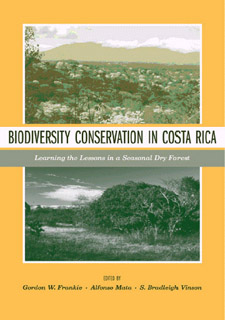 | Title: Biodiversity conservation in Costa Rica: learning the lessons in a seasonal dry forest Author: Frankie, G. W Published: University of California Press, 2004 Subjects: EcologyEvolutionEnvironment | Ecology | Conservation | Latin American Studies Publisher's Description: The beautiful tropical dry forest of northwest Costa Rica, with its highly seasonal rainfall and diversely vegetated landscape, is disappearing even more rapidly than Costa Rica's better-known rain forest, primarily because it has been easier to convert to agriculture. This book, based on more than thirty years of study, offers the first comprehensive look at the ecology, biodiversity, and conservation status of this endangered and fragile region. The contributors, from Costa Rica, Britain, Mexico, and the United States, and representing the fields of ecology, environmental education, policy, and the law, examine the major plant and animal groups living in the dry forest and present the first technical evaluation of Costa Rica's conservation efforts. As they assess the status of their area of specialty in the dry forest, the contributors also look beyond this particular region to show how its plants and animals are ecologically and evolutionarily connected to other geographic areas in Costa Rica and Central America. Their chapters cover topics such as watershed and coastal management, plant phenology, pollination, insects, birds, mammals, amphibians, and reptiles. They also consider the socioeconomic, policy, legal, and political aspects of biodiversity conservation, giving the volume a wide-ranging perspective and making a unique contribution to our knowledge of the tropical dry forest. The book concludes with an important synthesis of the contributors' recommendations on future directions, policies, and actions that will better conserve biodiversity in Costa Rica and other neotropical forests as well. [brief] Similar Items |
| 3. | 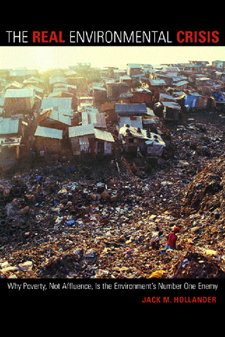 | Title: The real environmental crisis: why poverty, not affluence, is the environment's number one enemy Author: Hollander, Jack M Published: University of California Press, 2003 Subjects: EcologyEvolutionEnvironment | Conservation | Politics | Social Science | Politics Publisher's Description: Drawing a completely new road map toward a sustainable future, Jack M. Hollander contends that our most critical environmental problem is global poverty. His balanced, authoritative, and lucid book challenges widely held beliefs that economic development and affluence pose a major threat to the world's environment and resources. Pointing to the great strides that have been made toward improving and protecting the environment in the affluent democracies, Hollander makes the case that the essential prerequisite for sustainability is a global transition from poverty to affluence, coupled with a transition to freedom and democracy. The Real Environmental Crisis takes a close look at the major environment and resource issues - population growth; climate change; agriculture and food supply; our fisheries, forests, and fossil fuels; water and air quality; and solar and nuclear power. In each case, Hollander finds compelling evidence that economic development and technological advances can relieve such problems as food shortages, deforestation, air pollution, and land degradation, and provide clean water, adequate energy supplies, and improved public health. The book also tackles issues such as global warming, genetically modified foods, automobile and transportation technologies, and the highly significant Endangered Species Act, which Hollander asserts never would have been legislated in a poor country whose citizens struggle just to survive. Hollander asks us to look beyond the media's doomsday rhetoric about the state of the environment, for much of it is simply not true, and to commit much more of our resources where they will do the most good - to lifting the world's population out of poverty. [brief] Similar Items |
| 4. | 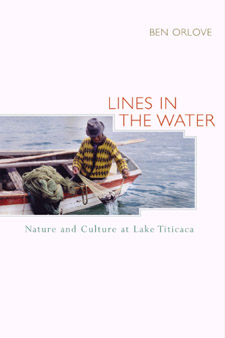 | Title: Lines in the water: nature and culture at Lake Titicaca Author: Orlove, Benjamin S Published: University of California Press, 2002 Subjects: Anthropology | Environmental Studies | Latin American Studies | Conservation Publisher's Description: This beautifully written book weaves reflections on anthropological fieldwork together with evocative meditations on a spectacular landscape as it takes us to the remote indigenous villages on the shore of Lake Titicaca, high in the Peruvian Andes. Ben Orlove brings alive the fishermen, reed cutters, boat builders, and families of this isolated region, and describes the role that Lake Titicaca has played in their culture. He describes the landscapes and rhythms of life in the Andean highlands as he considers the intrusions of modern technology and economic demands in the region. Lines in the Water tells a local version of events that are taking place around the world, but with an unusual outcome: people here have found ways to maintain their cultural autonomy and to protect their fragile mountain environment. The Peruvian highlanders have confronted the pressures of modern culture with remarkable vitality. They use improved boats and gear and sell fish to new markets but have fiercely opposed efforts to strip them of their indigenous traditions. They have retained their customary practice of limiting the amount of fishing and have continued to pass cultural knowledge from one generation to the next--practices that have prevented the ecological crises that have followed commercialization of small-scale fisheries around the world. This book--at once a memoir and an ethnography--is a personal and compelling account of a research experience as well as an elegantly written treatise on themes of global importance. Above all, Orlove reminds us that human relations with the environment, though constantly changing, can be sustainable. [brief] Similar Items |
| 5. | 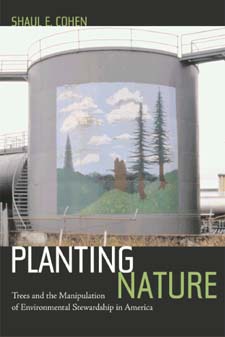 | Title: Planting nature: trees and the manipulation of environmental stewardship in America Author: Cohen, Shaul Ephraim 1961- Published: University of California Press, 2004 Subjects: Conservation | Geography | Environmental Studies | American Studies Publisher's Description: Trees hold a powerful place in American constructions of what is good in nature and the environment. As we attempt to cope with environmental crises, trees are increasingly enlisted with great fervor as agents of our stewardship over nature. In this innovative and impassioned book, Shaul E. Cohen exposes the way that environmental stewardship is undermined through the manipulation of trees and the people who plant them by a partnership of big business, the government, and tree-planting groups. He reveals how positive associations and symbols that have been invested in trees are exploited by an interlocking network of government agencies, private timber companies, and nongovernmental organizations to subvert the power of people who think that they are building a better world. Planting Nature details the history of tree planting in the United States and the rise of popular sentiment around trees, including the development of the Arbor Day holiday and tree-planting groups such as the National Arbor Day Foundation and American Forests. Drawing from internal papers, government publications, advertisements, and archival documents, Cohen illustrates how organizations promote tree planting as a way of shifting attention away from the causes of environmental problems to their symptoms, masking business-as-usual agendas. Ultimately, Planting Nature challenges the relationships between a "green" public, the organizations that promote their causes, and the "powers that be," providing a cautionary tale of cooperation and deception that cuts across the political spectrum. [brief] Similar Items |
| 6. | 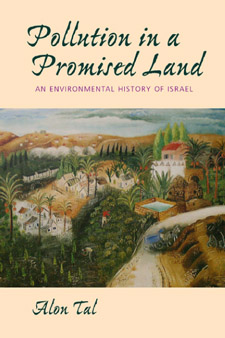 | Title: Pollution in a promised land: an environmental history of Israel Author: Tal, Alon 1960- Published: University of California Press, 2002 Subjects: EcologyEvolutionEnvironment | Jewish Studies | Ecology | Geography | Conservation Publisher's Description: Virtually undeveloped one hundred years ago, Israel, the promised "land of milk and honey," is in ecological disarray. In this gripping book, Alon Tal provides--for the first time ever--a history of environmentalism in Israel, interviewing hundreds of experts and activists who have made it their mission to keep the country's remarkable development sustainable amid a century of political and cultural turmoil. The modern Zionist vision began as a quest to redeem a land that bore the cumulative effects of two thousand years of foreign domination and neglect. Since then, Israel has suffered from its success. A tenfold increase in population and standard of living has polluted the air. The deserts have bloomed but groundwater has become contaminated. Urban sprawl threatens to pave over much of the country's breathtaking landscape. Yet there is hope. Tal's account considers the ecological and tactical lessons that emerge from dozens of cases of environmental mishaps, from habitat loss to river reclamation. Pollution in a Promised Land argues that the priorities and strategies of Israeli environmental advocates must address issues beyond traditional green agendas. [brief] Similar Items |
| 7. |  | Title: Engineering trouble: biotechnology and its discontents Author: Schurman, Rachel Published: University of California Press, 2003 Subjects: Sociology | Conservation | EcologyEvolutionEnvironment | Technology and Society | Agriculture | Technology | Public Policy Publisher's Description: Talk of genetically engineered organisms (GEOs) has moved from the hushed corridors of life science corporations to the front pages of the world's major newspapers. As Europeans began rejecting genetically engineered foods in the marketplace, the StarLink corn incident exploded in the United States and farmers set fire to genetically modified crops in India. Citizens and consumers have become increasingly aware of and troubled by the issues surrounding these new technologies. Considering cases from agriculture, food, forestry, and pharmaceuticals, this book examines some of the most pressing questions raised by genetic engineering. What determines whether GEOs enter the food supply, and how are such decisions being made? How is the biotechnology industry using its power to reshape food, fiber, and pharmaceutical production, and how are citizen-activists challenging these initiatives? And what are the social and political consequences of global differences over GEOs? [brief] Similar Items |
| 8. | 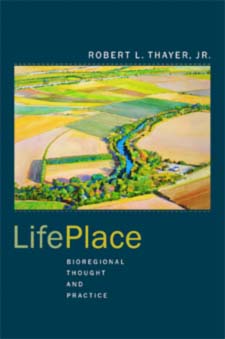 | Title: LifePlace: bioregional thought and practice Author: Thayer, Robert L Published: University of California Press, 2003 Subjects: EcologyEvolutionEnvironment | Conservation | Public Policy | California and the West | Public Policy Publisher's Description: Robert Thayer brings the concepts and promises of the growing bioregional movement to a wide audience in a book that passionately urges us to discover "where we are" as an antidote to our rootless, stressful modern lives. LifePlace is a provocative meditation on bioregionalism and what it means to live, work, eat, and play in relation to naturally, rather than politically, defined areas. In it, Thayer gives a richly textured portrait of his own home, the Putah-Cache watershed in California's Sacramento Valley, demonstrating how bioregionalism can be practiced in everyday life. Written in a lively anecdotal style and expressing a profound love of place, this book is a guide to the personal rewards and the social benefits of reinhabiting the natural world on a local scale. In LifePlace, Thayer shares what he has learned over the course of thirty years about the Sacramento Valley's geography, minerals, flora, and fauna; its relation to fire, agriculture, and water; and its indigenous peoples, farmers, and artists. He shows how the spirit of bioregionalism springs from learning the history of a place, from participating in its local economy, from living in housing designed in the context of the region. He asks: How can we instill a love of place and knowledge of the local into our education system? How can the economy become more responsive to the ecology of region? This valuable book is also a window onto current writing on bioregionalism, introducing the ideas of its most notable proponents in accessible and highly engaging prose. At the same time that it gives an entirely new appreciation of California's Central Valley, LifePlace shows how we can move toward a new way of being, thinking, and acting in the world that can lead to a sustainable, harmonious, and more satisfying future. [brief] Similar Items |
| 9. | 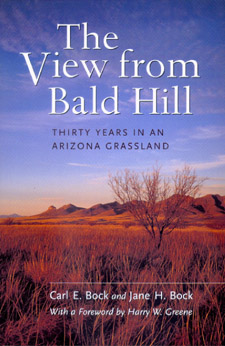 | Title: The view from Bald Hill: thirty years in an Arizona grassland Author: Bock, Carl E 1942- Published: University of California Press, 2000 Subjects: Environmental Studies | Conservation | California and the West | Ecology | Natural History | Science | Biology | Botany | Zoology Publisher's Description: In 1540 Francisco Vasquez de Coronado introduced the first domestic livestock to the American Southwest. Over the subsequent four centuries, cattle, horses, and sheep have created a massive ecological experiment on these arid grasslands, changing them in ways we can never know with certainty. The Appleton-Whittell Research Ranch in the high desert of southeastern Arizona is an 8,000-acre sanctuary where grazing has been banned since 1968. In this spirited account of thirty years of research at the ranch, Carl and Jane Bock summarize the results of their fieldwork, which was aimed at understanding the dynamics of grasslands in the absence of livestock. The View from Bald Hill provides an intimate look at the natural history of this unique site and illuminates many issues pertaining to the protection and restoration of our nation's grasslands. [brief] Similar Items |
| 10. | 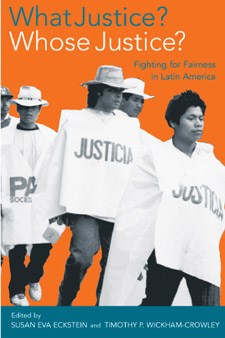 | Title: What justice? whose justice?: fighting for fairness in Latin America Author: Eckstein, Susan 1942- Published: University of California Press, 2003 Subjects: Sociology | Economics and Business | Conservation | Latin American Studies | Politics | Postcolonial Studies | Anthropology | Social Problems Publisher's Description: The new millennium began with the triumph of democracy and markets. But for whom is life just, how so, and why? And what is being done to correct persisting injustices? Blending macro-level global and national analysis with in-depth grassroots detail, the contributors highlight roots of injustices, how they are perceived, and efforts to alleviate them. Following up on issues raised in the groundbreaking best-seller Power and Popular Protest: Latin American Social Movements (California, 2001), these essays elucidate how conceptions of justice are socially constructed and contested and historically contingent, shaped by people's values and institutionally grounded in real-life experiences. The contributors, a stellar coterie of North and Latin American scholars, offer refreshing new insights that deepen our understanding of social justice as ideology and practice. [brief] Similar Items |